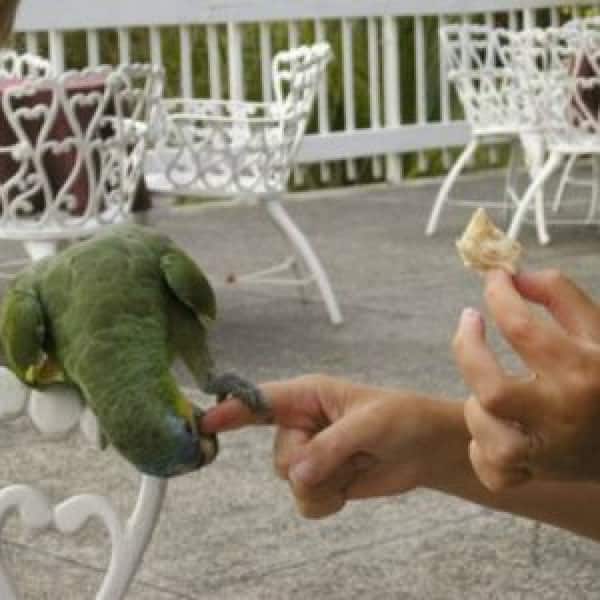
Why Cage Timeouts Will Not Solve Your Birds Biting Problem
Last Updated on by Mitch Rezman
A little bit about Facebook private groups. Because they are private groups, I cannot share the content that the members post nor any of the photos or videos from that group because they are “private“.
That said, the subjects themselves are well worth sharing so the only content from the group discussion will be that of mine with just a synopsis of how the problem was related to the Facebook group.
The conversation started about what the gentleman had referred to as a “hard tip” feather that was annoying the bird. Not surprisingly he got bit when he tried to pull the feather out. Not understanding the impact of what we call a broken blood feather as innocuous as it sounds can be responsible for the death of a pet bird.
If you are trying to get at the hard tip (feather shaft) of the feather the bird needs to be toweled. The feather can be examined to see if the shaft has blood in it (blood feather) If you are comfortable with it, you can pull the feather out with needle-nose pliers, just watch for bleeding and have some sort of blood coagulant nearby – cornstarch can work in a pinch, if not you might want to take the bird to the vet because if the bird breaks the feather off he could bleed out and die overnight. Read more about blood feathers here.
Not surprisingly he was annoying the bird he got bit when he tried to pull the feather out. Biting is not acceptable in any circumstance and returning them to the cage or ignoring will have no impact on the reduction of biting. I advocated that he start with clicker training and using a millet spray which would put 6 inches between the bird’s beak and his finger thus teaching them not to bite in a positive way.
His next response was that I really didn’t understand how intelligent birds were and he related an anecdotal incident about a birds behavior in a rescue.
I replied with
Trust me I understand the intelligence of birds and give the full credit BC – the biting thing is behavioral and has nothing to do with intelligence – I appreciate your anecdotal evidence but my paradigms arrive from interacting with tens of thousands of caged bird keepers.
Our Facebook fan page has 269,000 fans all homegrown over four years because they come to learn. And to be entertaining I interact with some the top avian vets in the world – the actual developers of much of the bird food that you see online – the CEOs of bird cage and accessory manufacturing facilities for the past 14 years.
I also posted this video to the group so he understood that I did, in fact, understand how intelligent birds were
When I intervene in a situation like this on Facebook my goal is to teach. I mean no disrespect to you sir but my sole role in life as a full-time gig is to be an advocate for caged birds. Correlation does not necessarily imply causation. If putting birds in a cage on a timeout solves the biting problem why haven’t we been able to stop birds from biting once and for all – just sayin’.
Biting like plucking and screaming are complex behavioral issues in part stemming from confusion caged birds have with everything from light cycles to clipped wings and poor nutrition.
Because we speak bird @ Windy City Parrot we can relate to you exactly what your bird is thinking when you lock him or her up in their cage.
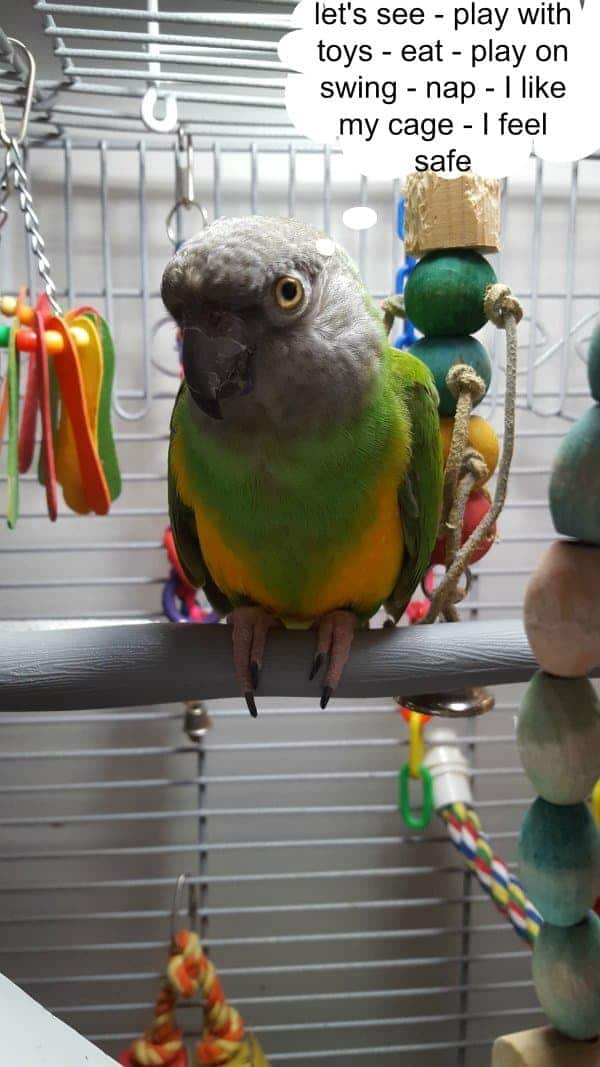
At what point does the bird receive behavioral modification when placed back in its cage? Aren’t you rewarding the bad behavior?
We can get you started on clicker training for two bucks. What is it that is preventing you from moving forward with clicker training?
File under: “three ways” are overrated.
The situation involved two birds (Nanday conures) and a human. Although eclectus parrots are polygamous as in both the females and males have multiple partners exchanging regurgitation for nookie, most parrots are monogamous.
When the third party, a human enters into their space – sometimes two’s company and three’s a crowd. We need to look at it from that perspective. You may love your birds but they might love each other and only look to you as a food source. Dude, I know that’s harsh but it is a potential reality.
Do we feed chops?
In that I have several thousand pounds of prepared bird food on hand I’m not very motivated to make chop – we often seek convenience foods for our own meals. I know I’ll catch a lot of flak for this but I think chop is overall wasteful and time-consuming. More importantly, you have no idea of the nutritional value – are you covering all your bird’s nutritional needs and where is the protein coming from? That’s my biggest question?
I’ve known Mark Hagen for years – I’ve had long talks with Ed Schmidt of Goldenfeast – I’ve spoken with Ted LeFeber at pet trade shows over the years – these three men have a combined hundred years experience in research and the manufacturing of quality bird food.
I have no need (nor desire) to re-invent the wheel. I’m not going to create anything for my bird on my own that comes close to the nutritional value you’ll find in nitrogen flushed sealed bags of bird food with full ingredient and nutritional labels.
Peaches will eat pretty much anything we put in front of her. Her daily diet is either Higgins Safflower Gold or Hagen Tropimix for parrots. She gets Lafebers Nutriberries (8% pellets) and Avicakes (50% pellets) along with raw walnuts, almonds and sunflower kernels (as rewards) throughout the day. But she also eats with us at the table on her own stand so she gets part of our salad, part of our pasta, part of our vegetables and maybe a bit of chicken or fish. But at the end of the day, I’m not relying on the human food to drive her metabolism.
I’ve unfortunately been laid up with a sprained ankle for a month so we haven’t had a chance to take her to see Dr. Byron at Animal House of Chicago. We took Popcorn in twice a year for well bird checks and always had a blood workup done. Thus we knew as long as the numbers looked good we didn’t have to change her diet – no guesswork.
Written by Mitch Rezman
Approved by Catherine Tobsing
Your Zygodactyl Footnote
Author Profile
Latest entries
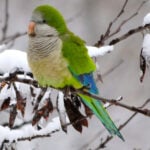 The Traveling BirdJune 26, 2025Can You Name 5 Parrot Species That Are Living Wild in the USA?
The Traveling BirdJune 26, 2025Can You Name 5 Parrot Species That Are Living Wild in the USA?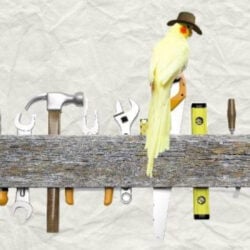 Bird BehaviorJune 26, 2025How is it Parrots Are Problem Solvers Social Animals and Even Use Tools?
Bird BehaviorJune 26, 2025How is it Parrots Are Problem Solvers Social Animals and Even Use Tools?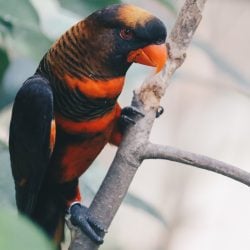 Bird & Parrot AnatomyJune 25, 2025How a Tiny Chemical Modification Makes Parrots Nature’s Living Paintings
Bird & Parrot AnatomyJune 25, 2025How a Tiny Chemical Modification Makes Parrots Nature’s Living Paintings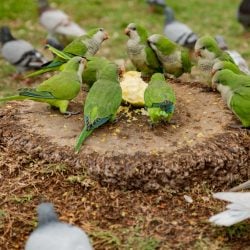 PigeonsJune 20, 2025How Do Parrots Thrive in Cities Outside Their Native Habitats?
PigeonsJune 20, 2025How Do Parrots Thrive in Cities Outside Their Native Habitats?
This Post Has 6 Comments
Leave a Reply
You must be logged in to post a comment.

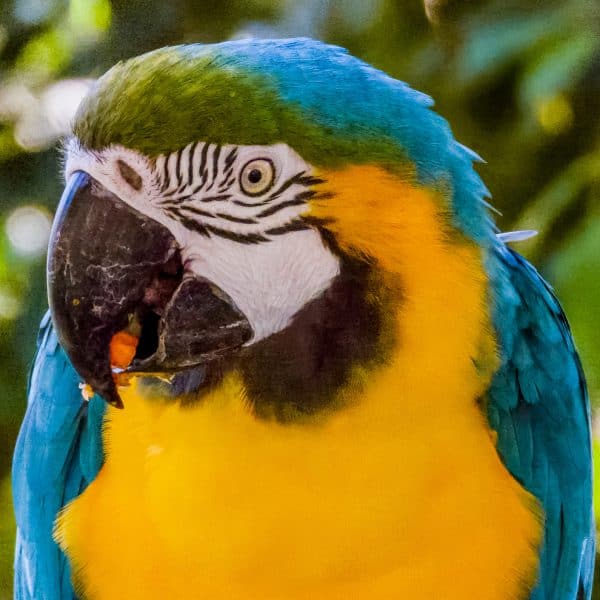
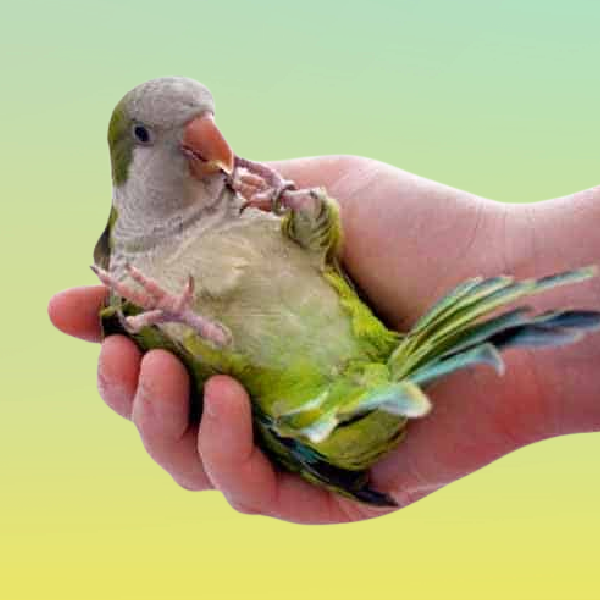
Heather Smillie Aycan
8 Jan 2017Good talk, but I am wondering if there is another way to stop my young Grey,Simon from biting. It isn’t so much an agressive bite but more :”I’m bored and want to go somewhere else. Take me somewhere more interesting.”This bite isn’t enough to make me bleed but it can startle me and keeps others from wanting anything to do with him…especially my husband who he adores.
nuclearnco
9 Jan 2017Our grey is similar. I can do anything with him, doesn’t matter what it is, he will tolerate it. He will even climb up onto my shoulder and head butt me then rest his bill against my cheek while I rub his head and neck. Who says CAGs are not cuddley? Not like a U2, but still.
Anyway my daughter can’t get near him due to how she was around him when she was little but the wife can, though, he is a little nippy with her and she can’t do near as much as I can. She can do much more when I’m not in the room or can be heard. My suggestion is that you handle your grey daily and with yummy berries and treats while your husband is away. Get it so your Grey is comfortable with you and then be the first and last to handle him with your husband in the same room.
It will let your grey know that you can be trusted and that for him to get to his preferred human that everything goes thru you. This weeks article is that putting the bird back in the cage is a reward and not punishment but I beg to differ. I feel it depends on the situation. In most cases caging doesn’t work but if he has to go thru you to get to your husband and he nips you, I’d put him back and then have your husband talk and sing the, ‘bird bird bird birdy bird bird’ song, then you get him again before the hand off. Greys learn things very fast, though they do pretend to not understand sometimes as well.
This process is working for us and has made things better overall but there is usually a favorite human. Make sure you both work with him to prevent it from becoming too much.
Sorry about long text, I swim upstream sometimes but I most always get to where I’m going and my CAG keeps my psychology type of observations …. fun. Love your grey, tolerate the husband.
WindyCityParrot
9 Jan 2017We love long content nuclerno – see it’s the “I feel it depends on the situation” you are clearly in top of it in our making the correct decisions dynamically. Many caged bird keepers are assuming “this is the birds behavior and if this doesn’t work nothing will work”
We are going through the snow ourselves with our recently rescued Senegal parrot peaches – she is bonded with me she will lunge at Catherine- if she is on my shoulder and Catherine comes to close to me I will get bit.
Catherine is now offering more food – bigger pieces and longer pieces so she doesn’t get bit but more importantly she is getting involved with clicker training.
Couldn’t agree with you more about getting involved with each and every one of your birds is much as you can daily as well as including the family members.
So yes we feel your pain and Catherine actually has begun to talk about getting “her own” bird which at the end of the day really makes a lot of sense.
When I met her she had to ringneck’s – she was bonded with the male and the female was insanely jealous will get aggressive every time Catherine tried to interact with the male it got so bad that we ended up putting honey the female into a breeding program and kept sunshine the male solo – but for the occasional meal I was persona non grata as long as Catherine was in the room.
Kudos for working your issues out with your birds and your family it truly is a journey with no single destination
WindyCityParrot
9 Jan 2017Hi Heather
Your gray is always watching you but you are not always watching your gray – you’re watching television or talking on the phone or you’re on the computer and your are right – our birds get needy.
I don’t keep peaches on my shoulder for that reason – she’s either in top of my desk chair or on a stand a couple of feet away from me where she can see me I can see her but she has activities like her foraging box.
So try to give Simon more enrichment activities and think about starting clicker training
This is my very needy bird not paying attention to me
https://www.youtube.com/watch?v=XxTjgpXPkQU
Best of luck – mitchr
WindyCityParrot
8 Jan 2017Hi Heather – we always recommend to star with 2 – 3 minutes of clicker training a day
from $2 https://windycityparrot.com/train-c-189_679/clicker-training-for-birds-includes-target-training-sticks-p-123.html
other training ideas https://windycityparrot.com/blog/2016/11/09/clicker-training-videos/
hope that helps – keep us up on your progress
mitchr